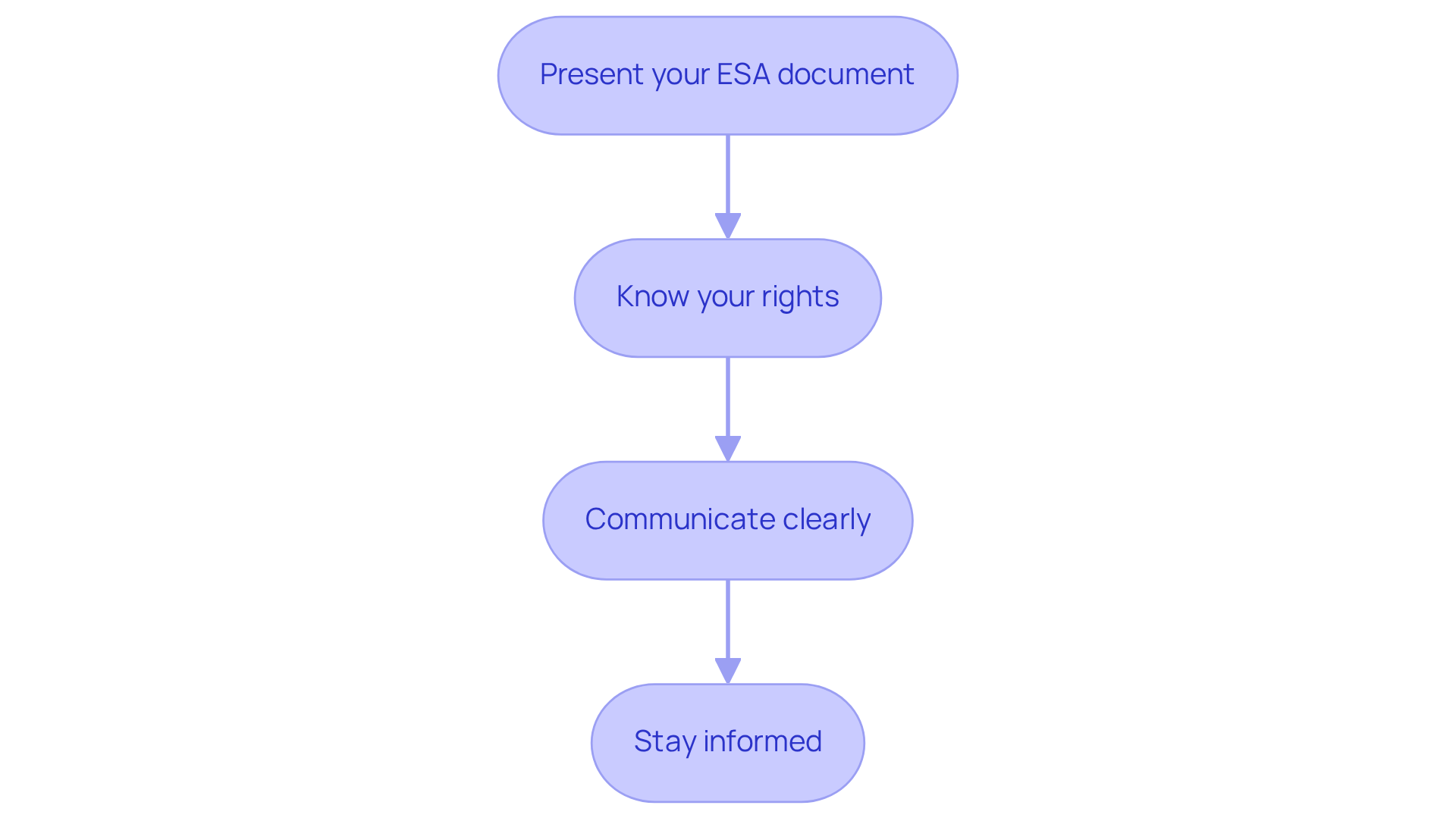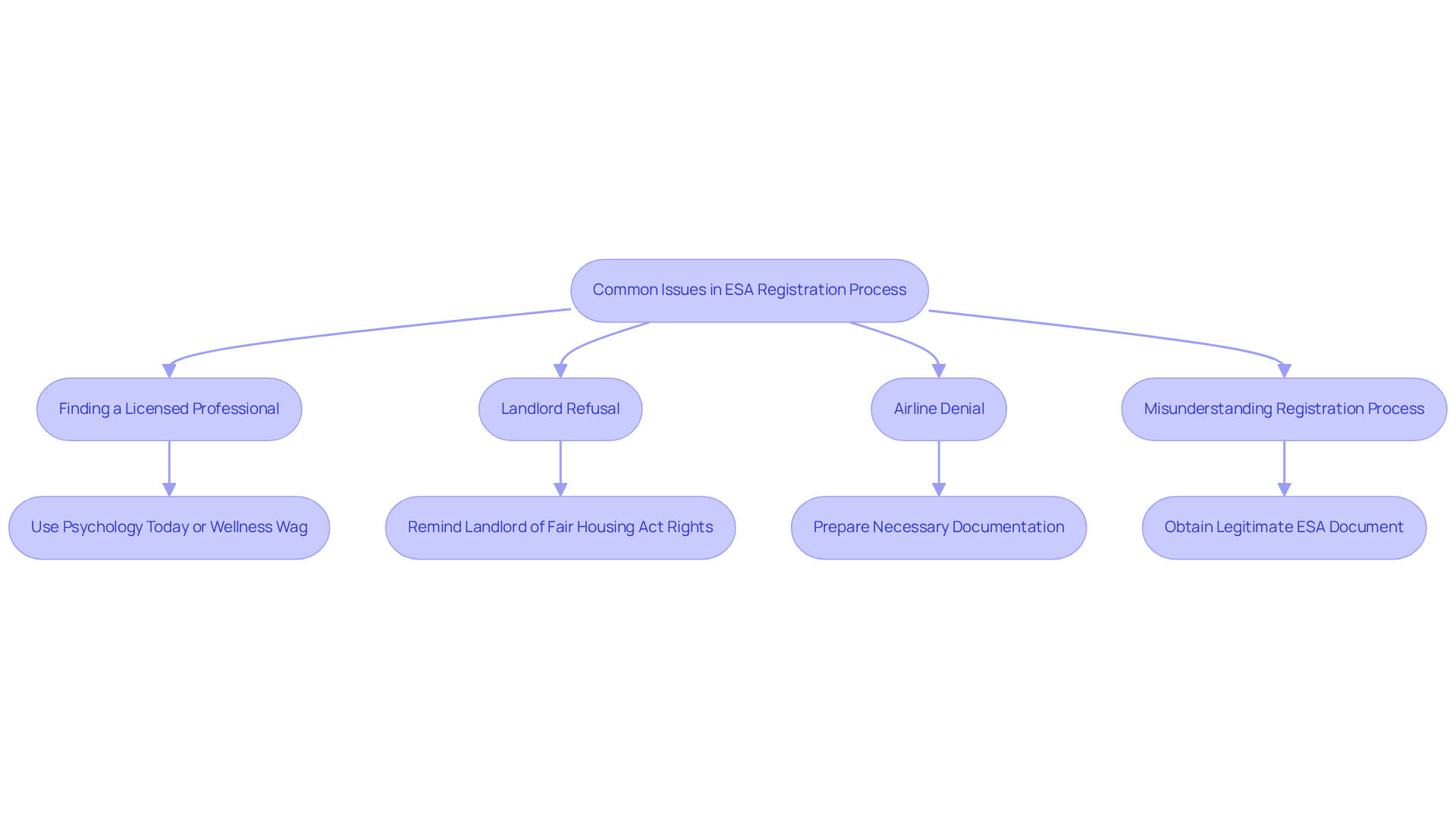

4 Steps to Register Emotional Support Animal California
by Lena Park
Last updated: July 5, 2025
Verified and Approved by:
Angela Morris,
MSW, LCSW
Fact Checked

Overview
In California, registering an emotional support animal (ESA) can feel overwhelming, especially for those navigating mental health challenges. It’s important to understand that while there is no official registration process in the state, obtaining a valid ESA letter from a licensed mental health professional is a crucial step. This letter not only serves as a lifeline but also ensures that individuals have legal protections under the Fair Employment and Housing Act.
Imagine the relief of knowing that you can advocate for your right to have an ESA without the burden of additional fees from landlords. This letter is more than just a document; it represents your needs and the support you deserve. It empowers you to create a nurturing environment where you can thrive alongside your emotional support animal.
As you consider this journey, remember that you are not alone. Many individuals have found comfort and companionship through their ESAs, and your story could be next. The support available to you is just a step away, and the ESA letter is a vital part of that journey. Embrace the possibility of healing and connection that an ESA can bring into your life.
Introduction
Understanding the nuances of Emotional Support Animals (ESAs) is essential for individuals seeking comfort and companionship on their journey toward emotional well-being. Many face emotional challenges that can feel overwhelming, and the recognition of ESAs is becoming increasingly important, particularly in California.
However, navigating the registration process can often seem daunting. This guide aims to clarify the essential steps to secure a valid ESA letter, while also addressing common challenges that may arise along the way.
How can one effectively advocate for their rights and ensure their emotional support animal is recognized and accommodated in a complex legal landscape? By exploring these questions, we can find reassurance and support in the process.
Define Emotional Support Animals and Their Legal Status in California
Emotional Support Animals (ESAs) play a vital role in providing comfort and assistance to individuals grappling with emotional or psychological challenges. Unlike service animals, ESAs do not require specialized training to perform specific tasks for their owners, making them a unique source of support. In California, the Fair Employment and Housing Act (FEHA) safeguards the rights of individuals with emotional support animals, mandating that landlords allow tenants to keep their emotional support animals if they register emotional support animal California and present the necessary documentation.
It’s essential to understand that there is no official way to register emotional support animal California, and any claims suggesting otherwise can be misleading. Instead, the focus should be on obtaining a valid ESA document from a licensed mental health professional to register emotional support animal California. This document is crucial in advocating for the rights of individuals who need emotional support. At Wellness Wag, we are dedicated to simplifying this process through our telehealth services, ensuring that individuals can easily obtain legitimate ESA letters.
Recent statistics reveal a significant increase in the recognition of emotional support animals. The National Service Animal Registry notes a rise from over 65,000 registered animals in 2015 to more than 240,000 today. Additionally, between 2002 and 2012, the number of emotional support animals in California surged by 1,000 percent, highlighting the growing acknowledgment of the emotional benefits these animals provide.
Under the FEHA, landlords are prohibited from charging additional fees or deposits for emotional support animals, reinforcing the legal protections available to their owners. It’s also important for tenants to know that if their ESA request is denied, they have the right to file a complaint with the Department of Housing and Urban Development (HUD). This legal framework is crucial in ensuring that individuals can access the support they need.
Moreover, during the COVID-19 pandemic, nearly 90% of almost 6,000 people with companion animals reported that their pets were a significant source of support. This further emphasizes the importance of ESAs in fostering emotional stability. At Wellness Wag, we are committed to empowering individuals by providing accessible ESA documents and transformative companionship that nurtures their emotional well-being.
Obtain a Valid ESA Letter from a Licensed Professional
Navigating the process to register an emotional support animal in California and obtain a valid ESA letter can feel overwhelming, but you are not alone. Here’s a compassionate guide to help you through each step:
- Consult a Licensed Mental Health Professional (LMHP): Begin by scheduling an appointment with a licensed therapist, psychologist, or psychiatrist who can understand your unique mental health needs. It’s important to ensure that the professional is licensed to practice in California to assist you in how to register an emotional support animal in California and provide you with the support you deserve.
- Establish a Client-Provider Relationship: To register an emotional support animal, California law requires that you have a minimum 30-day association with your LMHP before they can provide an ESA document. This time is essential for your professional to gain a deeper understanding of your mental health condition and to assess the necessity of an ESA in your life.
- Request the ESA Document: After your evaluation, if your LMHP believes that an ESA could positively impact your mental health, you can formally request the ESA document. This important document must include the professional’s license number, type, and the date it was issued, ensuring its validity.
- Review the Document: It’s crucial to ensure that the correspondence clearly states your need for an ESA and is written on official letterhead. This documentation is vital to register an emotional support animal in California, as it grants you rights under the Fair Housing Act, helping you feel more secure in your living situation.
- Understand Renewal Requirements: Remember that ESA documents typically expire after one year. To maintain your ESA status, you will need to renew it yearly through a licensed mental health professional. This ongoing support is part of your journey towards better mental health.
- Quick Turnaround Time: Wellness Wag understands your urgency and provides a swift turnaround, ensuring you receive your ESA document within 24 hours after your consultation. This efficient process helps you meet travel requirements without unnecessary delays.
- Money-Back Guarantee: To further reassure you, Wellness Wag offers a money-back guarantee, emphasizing their commitment to customer satisfaction. This assurance allows you to engage in the ESA documentation process with confidence, knowing that your needs will be prioritized.
You are taking a significant step towards enhancing your mental well-being. Remember, support is available, and you deserve to feel cared for throughout this process.
Register Your ESA with the Appropriate Authorities
While California does not have an official registration process for Emotional Support Animals (ESAs), there are several compassionate steps you can take to ensure your ESA is recognized and supported:
- Present your ESA document. When seeking accommodation or traveling, always provide your ESA document to landlords or airline representatives. This document is crucial as it confirms your need for an emotional support animal, ensuring you are adhering to legal requirements. At Wellness Wag, we strive to deliver your ESA letter within 24 hours of approval, so you have the necessary documentation promptly.
- Know your rights. Understanding the protections offered by the Fair Housing Act and the Air Carrier Access Act is essential. These regulations affirm your right to have an ESA in housing and during air travel. Importantly, landlords cannot impose additional pet fees for ESAs, and airlines are required to accommodate your ESA as long as you present the appropriate documentation. Additionally, service dog owners enjoy complete public access privileges under the Americans with Disabilities Act (ADA), which can further strengthen your case when discussing your ESA.
- Communicate clearly. When discussing your ESA with landlords or airline staff, clearly express your entitlements and the legal safeguards available to you as an ESA owner. Open communication can help alleviate misunderstandings and ensure adherence to the law. For instance, sharing real-world examples of successful ESA accommodations can bolster your position and instill confidence.
- Stay informed. Keeping up to date with any changes in California’s ESA regulations and the Fair Housing Act is crucial. Understanding your entitlements and responsibilities will empower you to advocate effectively for your ESA, especially in situations where your rights may be challenged. Certification or documentation from recognized organizations can also enhance your credibility as an ESA owner.
By following these supportive steps, you can navigate the complexities of ESA recognition in California and register emotional support animal California to ensure that your emotional support animal is acknowledged and accommodated with the care and respect they deserve.

Troubleshoot Common Issues in the ESA Registration Process
Navigating the process to register emotional support animal California can be quite challenging, and it’s completely understandable to feel overwhelmed. Many individuals face obstacles along the way, but there are effective solutions to help you through these difficulties.
-
Finding a Licensed Professional can be a struggle. It’s important to connect with someone who understands your needs. A great place to start is Psychology Today, where you can find a directory of therapists in your area. This resource can simplify your search and ensure you connect with qualified providers. Additionally, many individuals have found success using Wellness Wag’s platform, which makes the process even easier.
-
If you encounter a Landlord Refusal to Accept Your ESA Letter, remember that you have rights protected under the Fair Housing Act. Gently remind your landlord of these rights and provide them with documentation that outlines their legal responsibilities. Many Wellness Wag users have shared that being well-informed about these rights has significantly helped them in gaining acceptance for their ESA documents.
-
In cases of Airline Denial of ESA Travel, it’s essential to have all necessary documentation, including your ESA letter, ready. Reach out to the airline’s customer service for specific information about their policies regarding ESAs, as these can vary widely. Numerous Wellness Wag clients have reported successful travel experiences after following the proper procedures, and you can too.
-
Lastly, there’s often a misunderstanding about how to register emotional support animal california. It’s important to clarify that California does not have an official ESA registry. Instead of seeking unofficial registration, focus on obtaining a legitimate ESA document to register your emotional support animal in California from a qualified expert. This documentation is vital for your rights and arrangements. As specialists have noted and Wellness Wag users have confirmed, ensuring your ESA documentation meets legal requirements is crucial to avoid unnecessary denials.
By addressing these common issues with informed solutions, you can more effectively navigate the process to register emotional support animal california and advocate for your rights with confidence. Remember, Wellness Wag is here to support you in obtaining your ESA letter, ensuring your journey is met with understanding and care.

Conclusion
Emotional Support Animals (ESAs) are invaluable companions for individuals navigating the emotional and psychological challenges of life. The journey to secure the necessary documentation for an ESA in California can feel daunting, but understanding the process and knowing your rights can empower you to advocate effectively for your needs.
This guide has outlined essential steps to obtain a valid ESA letter, highlighting the importance of:
- Consulting a licensed mental health professional
- Building a supportive relationship
- Ensuring that your documentation meets legal requirements
We’ve also explored the legal protections provided under California’s Fair Employment and Housing Act, alongside practical tips for overcoming common challenges in the registration process.
Recognizing the vital role that ESAs play in fostering emotional well-being is crucial. Being informed about the registration process is your first step toward securing the support you deserve. We encourage you to take action, seek assistance from qualified professionals, and remain aware of your rights. By doing so, you can ensure that your emotional support animals are recognized and accommodated, paving the way for a more fulfilling and stable emotional journey. Remember, you are not alone in this; there is support available to help you every step of the way.
Frequently Asked Questions
What are Emotional Support Animals (ESAs)?
Emotional Support Animals (ESAs) provide comfort and assistance to individuals dealing with emotional or psychological challenges. Unlike service animals, ESAs do not require specialized training to perform specific tasks.
What is the legal status of ESAs in California?
In California, the Fair Employment and Housing Act (FEHA) protects the rights of individuals with emotional support animals, requiring landlords to allow tenants to keep their ESAs if they present the necessary documentation.
Is there an official way to register an emotional support animal in California?
No, there is no official way to register an emotional support animal in California. Claims suggesting otherwise can be misleading. Instead, individuals should obtain a valid ESA document from a licensed mental health professional.
How can individuals obtain a legitimate ESA letter?
Individuals can obtain a legitimate ESA letter through telehealth services, such as those offered by Wellness Wag, which simplify the process of acquiring the necessary documentation.
What has been the trend in the recognition of emotional support animals?
There has been a significant increase in the recognition of emotional support animals, with registered ESAs rising from over 65,000 in 2015 to more than 240,000 today, and a 1,000 percent increase in California from 2002 to 2012.
Are landlords allowed to charge fees for emotional support animals?
No, under the FEHA, landlords are prohibited from charging additional fees or deposits for emotional support animals.
What can tenants do if their ESA request is denied?
If a tenant’s request for an emotional support animal is denied, they have the right to file a complaint with the Department of Housing and Urban Development (HUD).
How have emotional support animals impacted individuals during the COVID-19 pandemic?
During the COVID-19 pandemic, nearly 90% of almost 6,000 people with companion animals reported that their pets were a significant source of support, highlighting the importance of ESAs in fostering emotional stability.
Certify Your Emotional Support Animal Today

Why You Can Rely on Us?
At Wellness Wag, we believe your pet deserves care rooted in both science and compassion. Each article is carefully researched, written in clear language for pet owners, and then reviewed by qualified professionals to ensure the information is evidence-based, current, and practical for real-life care. Our goal is to help you feel confident in making informed decisions about your pet’s health and well-being.
Reviewed by
Angela Morris, MSW, LCSW
Angela is a licensed clinical social worker with 20 years of experience in patient advocacy and community mental health. She has assisted numerous clients with ESA evaluations and brings a deep understanding of disability accommodations, ensuring that all information is accurate, supportive, and practical.

Written by :
Lena Park
Last Updated :
July 5, 2025












